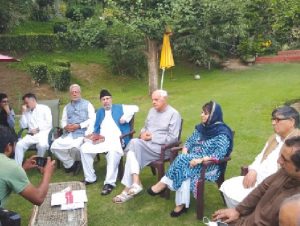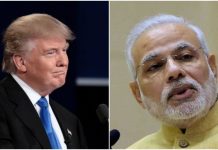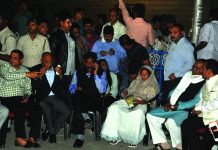 On November 6, six party strong People’s Union for Gupkar Declaration (PAGD) went to J&K’s winter capital to rally support among the masses for their struggle for restoration of Article 370 that granted J&K its semi-autonomous status within Indian Union. The National Conference leaders Dr Farooq Abdullah, his son Omar Abdullah travelled to Jammu to hold meeting with their workers, so did Mehbooba Mufti, all of them former Chief Ministers. It created a buzz in Jammu. And unlike in Kashmir where they can’t hold any unhindered political activity, in Jammu they could freely address their workers. And their point of view even resonated far beyond their meetings with their workers.
On November 6, six party strong People’s Union for Gupkar Declaration (PAGD) went to J&K’s winter capital to rally support among the masses for their struggle for restoration of Article 370 that granted J&K its semi-autonomous status within Indian Union. The National Conference leaders Dr Farooq Abdullah, his son Omar Abdullah travelled to Jammu to hold meeting with their workers, so did Mehbooba Mufti, all of them former Chief Ministers. It created a buzz in Jammu. And unlike in Kashmir where they can’t hold any unhindered political activity, in Jammu they could freely address their workers. And their point of view even resonated far beyond their meetings with their workers.
“They (BJP) ask us to go to Pakistan. If we would have had to go to Pakistan, we could have gone there in 1947. No one could have stopped us. And the BJP would have been on the other side of Lakhanpur,” Abdullah told the jam-packed convention hall of the NC headquarters where the senior party leaders and workers including Provincial President Devender Singh Rana welcomed Farooq Abdullah and Omar Abdullah in the party office for the first time after the revocation of Article 370 on August 5, 2019. “That time Sheikh Mohammed Abdullah (his father and NC founder) told the people that our destiny was with Mahatma Gandhi’s India, not with BJP’s Hindustan.”
Both leaders were accompanied to the party headquarters in a rally. He asked the BJP where was it when he was fighting India’s case in Geneva alongside the former Prime Minister and the BJP leader Atal Bihari Vajpayee. “When he was told to speak, Vajpayee was not able to speak there,” Abdullah said. “Today the same is termed as Pakistani”.
Similarly, Omar warned Jammu that before people from outside J&K buy land in Kashmir they will buy it in Jammu. “The road to Kashmir passes through Jammu” he said.
He also questioned claims of the Government that agricultural land is protected under the new land laws saying it has been clearly mentioned in the new land law that agricultural land can be sold by converting it into non-agricultural land.
And Mehbooba who went separately to the winter capital was more fiery in her rhetoric. In her speech to her party workers, she said that the suppression of people’s voices had created a “pressure cooker-like situation” in J&K.
But when the pressure cooker explodes it burns down the whole house,” Mehbooba said adding the time would come when the Centre would ask the people “with folded hands” what more did they want besides restoration of the special status of the former state.
Gupkar alliance is also expected to hold consultations with like-minded parties to try and get them on board the struggle for restoration of special rights for Kashmiris. Earlier the alliance had visited the Muslim majority Kargil in Ladakh to seek their support for their struggle. An Omar headed delegation of the PAGD visited Kargil to talk to the political groups there who also want the reversal of Article 370 move and rejoining of Ladakh with J&K.
On October 29, a collection of political and socio-religious organisations in Kargil announced the formation of the new Kargil Democratic Alliance (KDA) mirroring PAGD in J&K.
According to Qamar Ali Akhoon, a veteran National Conference leader from Kargil, the alliance has two agendas. “We seek restoration of Article 370 but until that happens we demand the statehood for Ladakh union territory.”
This split Ladakh down the middle as it’s another district, the Buddhist majority Leh is content with the union territory status but seeks constitutional safeguards provided under sixth schedule. Leh recently voted the Bharatiya Janata Party back into power in its autonomous hill district council. This has made the situation really complex. In Ladakh it has become Leh versus Kargil, whileas in J&K, it is broadly Kashmir versus Jammu. A majority in Leh and Jammu want protections for Land and employ sans restoration of Article 370, something that is demanded by Kashmir and Kargil.
However, it is also true that in recent months, Jammu and Leh have exhibited visible signs of disaffection with the post Article 370 move state of affairs. A looming prospect of demographic change, loss of jobs, land rights and identity have made people uneasy. But while the expression has been muted in Jammu, people have been vocal about their rights in Leh. In fact, all parties in the union territory recently closed ranks against entry of outsiders and to this end had threatened to boycott elections if the centre didn’t promise safeguards like the grant of 6th Schedule of Constitution. Centre was prompt to assure these protections to Ladakh unlike its approach to Kashmir. But until it actually grants these safeguards, Leh will have reason to feel apprehensive.
At the same time, Muslims in Kargil who are in a slim majority in Ladakh union territory, aren’t interested in these safeguards. Like their counterparts in Kashmir, they also want reversal of Article 370 move and rejoining of Ladakh with J&K.
In Jammu, on the other hand, the parties other than the BJP have a varying degree of beef with the new state of affairs, although the local parties like Panthers Party support the revocation of Article 370 but ironically want Article 370 like guarantees to protect the region’s unique identity. Helpfully for new Kashmir alliance, Congress, a national party, has supported restoration of Article 370 and the rights for Kashmiris. In fact, the party is a constituent of the Gupkar alliance but has chosen to skip its recent meetings, most likely because of its electoral compulsions in other parts of the country.
This opens up a possibility that the three regions can agree on a common minimum agenda. And should that happen it will be a major achievement for the six party alliance and will only strengthen its case at the national level. Also, a broad regional cooperation on the issue of rights of J&K will afford more space for political activity to the leaders in Kashmir. Such an alliance will also require influential local leaders to represent it in Jammu and Ladakh.
But there is still uncertainty about the chances of a regional cooperation happening anytime soon. Or happening of it at all. The reasons are the deep mutually antagonistic political cultures and the largely contradictory interests of the three regions. Even, in case of Ladakh where Muslims are in a slight majority, their political weight is undone by the centre’s support for Buddhists. So, for a regional alliance to materialize, all such opposing forces will have to be reconciled. This will not be an easy task.
As for remaining a Kashmir-centric grouping, the PAGD will have little political space to operate. Centre is likely to come down hard on the alliance at any sign of the civil strife, that will be promptly traced to its actions, real or imagined.
One option for the new mainstream political grouping to build some pressure on New Delhi is to mount a sustained public resistance against the erasure of the special status. But there are valid doubts about the scope for such a resistance at a time when the centre has drastically squeezed the space for any democratic dissent in the region. And the Gupkar amalgam is mindful of this fact: They have so far issued the joint statements, given themselves a name. formalized their structure and worked out an agenda but stayed well short of calling for a peaceful protest, a public rally, a press conference or for that matter even a hartal.
At the same time, even if the parties were to mobilize the public opinion against the withdrawal of Article 370, their ability to force a shift in centre’s policy will be minimal. For in doing so, they will be up against the new national consensus on Kashmir that sees the integration of the former state into India as a fait accompli.
This makes the demand for the restoration of Article 370 just like the one for autonomy, self rule and Achievable Nationhood. Much will also depend on the evolving geo-politics of the region and how India’s equations with China and Pakistan will shape up, and also whether Afghanistan will pass again into the hands of Taliban.
“It still remains to be seen how these developments will impact Kashmir,” said Naseer Ahmad, a local columnist. “As of now, a Kashmir observer has no option but to stay with his fingers crossed”.
letters@tehelka.com












